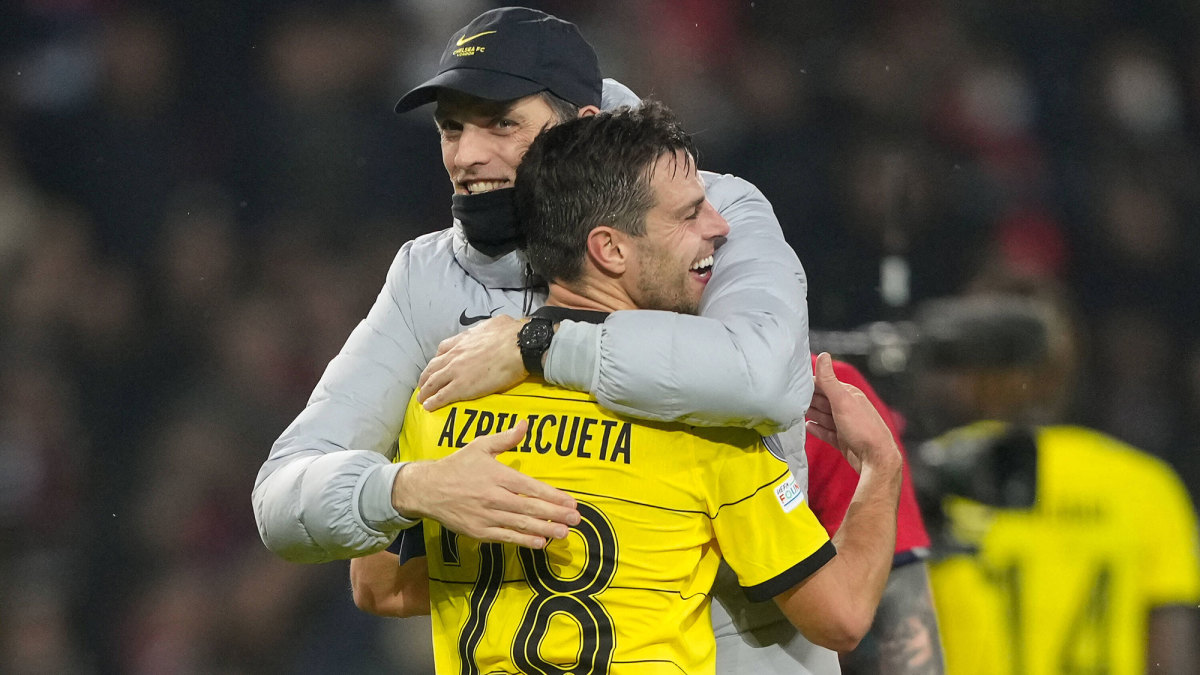As Chelsea’s World Swirls, Its Champions League Title Defense Continues

Uncertainty may haunt Chelsea’s future, but for now and on the pitch, Thomas Tuchel’s side continues to play with a greater authority than it has at any previous point this season. Leading 2-0 from the first leg in the Champions League last 16, it should never have really been in danger of elimination, but it was nonetheless impressive how calm Chelsea appeared in the cauldron of Lille, winning 2–1 Wednesday for a 4–1 aggregate victory. The Blues join Manchester City, Liverpool, Real Madrid, Bayern Munich, Atlético Madrid, Benfica and Villarreal—a convincing winner over downtrodden Juventus in Wednesday’s other match—to round out the final eight.
The atmosphere at the Stade Pierre Mauroy was ferocious, and in the opening stages Lille hurled itself at Chelsea. For a time, it seemed Chelsea might be wobbling, falling behind to a 38th-minute Burak Yilmaz penalty after Jorginho had been whistled for a handball following a VAR review. But, just as an upset began to seem possible, Jorginho threaded a pass through for Christian Pulisic to equalize with what was Chelsea’s first meaningful attack of the half. The sense of control, of being able to score when it needed to, was probably illusory, but Chelsea’s character was not.

Whatever else is going on, and whatever may happen in the future, for now the sense is that adversity has bonded the players. But while the squad appears resolute and while Tuchel has been admirably realistic in the circumstances, others in and around the club seem still to be adjusting to Chelsea’s new status. On Tuesday came an extraordinary statement from the club’s board asking demanding that Saturday’s FA Cup quarterfinal at Middlesbrough “be played behind closed doors for matters of sporting integrity.”
Middlesbrough, understandably, replied with scorn, describing the statement as “bizarre and without any merit.” Its chairman, Steve Gibson, then gave an interview in which he pointed out that the way Chelsea had spent money in the early years of Roman Abramovich’s ownership was itself so distorting as to be contrary to “sporting integrity.” A senior government source quoted in The Guardian said the statement was “like a drowning person in shark-infested waters, complaining they aren’t on an oligarch’s yacht and threatening the people throwing them a life ring.”
Chelsea’s demand lacked even internal consistency. If there is an issue with integrity because Chelsea was able to sell only around 600 of its 4,500 ticket allocation at Middlesbrough before sanctions were imposed, surely it would then follow that, given it is unable to sell any more tickets for home games, all league matches at Stamford Bridge should now be played behind closed doors, locking out 28,000 season-ticket holders?
That statement was subsequently withdrawn in the face of widespread derision, but the Chelsea Supporters Trust had by then already released an absurdly pompous statement of its own. “The CST has made it clear to the government and the sports minister that supporters must be able to watch their team,” it said. “Playing behind closed doors does not benefit supporters.” To which the response can only be to wonder at the mentality of anybody who can see the scenes from Mariupol, Kharkiv and Kyiv and think that their right to go to a Cup tie at Middlesbrough is anywhere near a government priority.

Sanctions are blunt tools, imposed only in extremis, and it will take time for the license under which Chelsea is operating to be fine-tuned. There was no obligation for the government to offer Chelsea a special license at all. It’s understandable that Chelsea fans are worried, but with the deadline for bids on Friday the likelihood is that it will be bought by another billionaire. And even if a change of ownership means investment slows in the coming years, to speak of Chelsea being punished, as some fans have, is rather to ignore the fact that the club has benefited from £1.5 billion of owner investment over the past 19 years. That’s the nature of a deal with an oligarch owner: if you didn’t protest against the signing of Glen Johnson in 2003, you can’t really protest when the money-tap is turned off now.
For now, though, the full consequences of the sanctions are yet to be experienced on the pitch. Xeka headed against the post early in the second half to present a minor scare, but Chelsea held firm and eventually made the tie safe with 19 minutes remaining, with Cesar Azpilicueta kneeing in a Mason Mount cross after a very patient build-up. Perhaps it wasn’t the most comfortable performance, but defending a two-goal lead in a second leg can lead to confusion of approach. Chelsea did enough. It had the mettle to resist and then the quality to score.
Greater challenges lie ahead, both on and off the pitch, but Chelsea, again, is in the quarterfinal of the Champions League, its defensive still very much alive.
More Soccer Coverage:
